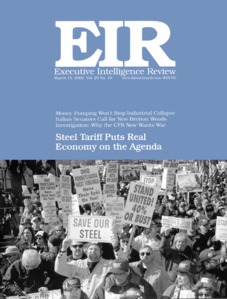Bush’s Action on Steel Tariffs Means the Real Economy Is Back on the Agenda
by Anita Gallagher
The near-collapse of the U.S. steel industry forced the President to shift from a “free trade” to “fair trade” position to save the U.S. steel sector. The decision has far-reaching implications domestically and abroad.
The Tariff Itself Is Not Europe’s Problem
by Lyndon H. LaRouche, Jr.
President Bush’s decision “portends what will probably become, rather suddenly, the most portentous, systemic shift in world-wide economic policy in thirty years.... Does the increased tariff on steel imports mean a collapse of Europe’s exports to the U.S.A.? In and of itself, the answer is: ‘It does not constitute such a threat.’”
Economics
In the United States, Wet Dreams of Recovery Run On
by John Hoefle
The Recovery is coming!, the refrain of a gaggle of financial Chicken Littles, is based on the very real fear that the global financial system is coming down. They are desperate to keep their failing bubble going, and to head off the only viable alternative, the New Bretton Woods proposal of Lyndon LaRouche.
Italian Senators Call for New Bretton Woods
Argentina Driven to Ungovernability
by Cynthia R. Rush and Gerardo Terán Canal
IMF Devastation Brings Dengue to the Americas
by Paul Gallagher
China Congress Told It Faces ‘Volatile’ World
by Mary Burdman
Keplerian Economics: Wealth as Curvature
by Jonathan Tennenbaum
Part 2 of a pedagogical exercise.
Feature
Money-Pumping Won’t Stop Industrial Collapse
by Lyndon H. LaRouche, Jr.
A March 5 interview with Lyndon LaRouche, conducted by Salt Lake City radio talk show host Jack Stockwell. Those who are pumping liquidity into the economy, LaRouche said, “were talking about the ‘recovery’—it’s like Dracula, as I call it—promising the suckers a midnight recovery. And the suckers are buying.” But the whole system is coming down, and hyperinflationary money-pumping only makes the collapse of physical production that much worse.
Investigation
The CFR Spreads Fantasies of New War and Empire
by Jeffrey Steinberg
The New York Council on Foreign Relations, the American branch office of the British Royal Institute for International Affairs, has issued a public call for a full-scale war on Iraq, as a stepping-stone to imperial world government.
‘Neo-Imperialism’ Is Utopian-Speak for ‘American Suicide’
by Stanley Ezrol
International
Hindu-Muslim Riots Show: India Must Face Reality
by Ramtanu Maitra
The orchestration of riots by “Clash of Civilizations” adherents, has brought to focus the threat to India’s stability, and poses the need for the government to finally seriously address the deepening economic and social crisis.
LaRouche on Gujarat Riots
by Lyndon H. LaRouche, Jr.
UN Monterrey Meeting Targetted by Terrorists
by Gretchen Small
Clash of Civilizations ‘Left’ Forces Gather
by Silvia Palacios
Venezuela: Chávez Clings to Power, Radicalizes Revolution
by David Ramonet
Echoes of the Warsaw Ghetto in Gaza and the West Bank
by Dean Andromidas
Egypt Urges Bush To Restrain Israel’s Sharon
by William Jones
‘Inner War’ Heats Up in Britain Over Iraq War
by Mark Burdman
LaRouche’s Economics Text Is Now in Croatian
by Elke Fimmen
National
Open Reply to Ari Fleischer: Peace Between Two Presidents
by Lyndon H. LaRouche, Jr.
“On the subject of President William Clinton’s role in Middle East peace negotiations, he made only two notable mistakes: ... he allowed the exclusion of the two issues on which an actual Middle East peace depends, absolutely: the issue of economic development, and especially, the issue of mass desalination.”
Creating New Mideast Water Resources Is a Necessity for Economy and Peace
by Marcia Merry Baker
D.C. Health Head Quits, Hospital Issue Returns
by Lynne Speed
Congressional Closeup
by Carl Osgood
Book Review
Portrait of an Instant Imperialist
by Tony Papert
Warrior Politics: Why Leadership Demands a Pagan Ethos, by Robert D. Kaplan.
Departments
Editorial
A New Pollard Affair?



